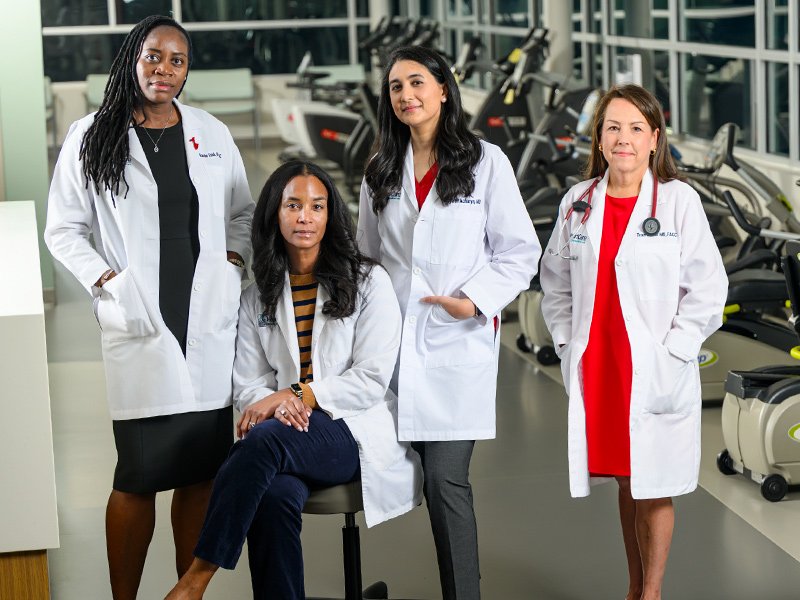Meet four women making a name for themselves and Heart & Vascular — and see why donors are supporting them.

Cone Health’s legacy in cardiovascular care continues to evolve in exciting ways and Dr. Gayatri Acharya, Dr. Tiffany Randolph, Dr. Kardie Tobb and Dr. Traci Turner are proud to be a part of the evolution.
As integral members of a team pioneering advancements to help community members prevent heart disease, each brings her own expertise to the mission of prevention as they take on the nation’s leading killer.
Acharya helps ensure Cone Health offers the highest-quality scans for disease detection, with perpetual quality review.
Randolph is out to end the scourge of untreated hypertension and recently founded the Advanced Hypertension Clinic.
Tobb has created the Cone Health Cardio-Obstetrics Clinic, aimed to help improve maternal cardiovascular outcomes.
Turner is an expert on the impact of sleep disorders on cardiovascular health.
While most health systems focus solely on treatment, Cone Health is braving a different path, balking at the traditional model for compensation in America’s health system and making the patients’ best interests the ultimate priority.
“Our group is committed to helping prevent cardiovascular disease, not just treat it once it arises,” Randolph says. “We're more concerned about the health of the community than maximizing profit.”
Prevention is not just innovative, it’s bold. That’s why these women are here. Bold is just what the doctor ordered.
“We have a voice in this practice,” Tobb explains. “When we share our vision for how we want to positively impact the community, we are heard and supported.”
Their vision includes collaborating with patients, team members, and local primary care doctors, advocating for access, and going out into the community to help people understand how to prevent disease.
Another shared commitment? Advancing the understanding of women’s heart health.
Women Healing Women
Women are just as susceptible to dying from heart disease as men yet, historically, research has been focused on men. Women face distinct risks. They require different types of treatments. It has taken a considerable amount of time for science to recognize that the anatomy and electrical pathways of the female heart are unique. Cone Health is actively addressing this disparity, conducting research, and providing specialized clinics and approaches.
A prime example, given that cardiovascular disease is a leading cause of maternal mortality in the U.S., is Tobb’s focus on cardio-obstetrics.
“During my interviews, Cone Health’s dedication to serving women and children impressed me,” Tobb says. One of her career goals was to practice where she could study how cardiometabolic diseases impact reproductive health, merging the two fields, a common practice for Cone Health. Rather than practicing in silos, physicians partner across service lines. Cardio-oncology is another example.
After Tobb accepted the position, she opened a Cardio-Obstetrics Clinic in the MedCenter for Women.
“There is a can-do attitude here,” she says. “When I brought that idea, the response was, ‘How can we support you?’”
Randolph joined Cone Health as a fellow in 2016. It was an opportunity to “test the waters'' at a community health system after training at Wake Forest, UNC-Chapel Hill, Duke and Harvard. She arrived with some preconceptions about how a community-based hospital operated.
“What I realized was that really complex care is delivered here, along with the ability to conduct research and clinical trials,” she says. “Every time I have an idea, it’s always, ‘Let’s figure out how to make it happen.’ This is a place of continuous improvement and that's not something you see everywhere.”
When Randolph created the Advanced Hypertension Clinic in 2021, she paved the way for Cone Health to address problems associated with high blood pressure, a condition affecting nearly half of all U.S. adults. Now, Randolph is running a study that employs Bluetooth technology, telemedicine and community partnerships to lower blood pressure faster, allowing for fewer office visits, especially for those who have trouble making in-person appointments.
For Acharya, after spending seven years training at the Mayo Clinic, better care means offering community members exceptional cardiovascular imaging, right here at home. Cone Health is a Top 5 in-the-nation user of heartflow imaging to identify cardiovascular disease.
“We won’t settle for anything less for our patients, and we’re pretty bulldogged about it,” she says.
“It’s not just a shiny machine,” Randolph adds, continuing Acharya’s assertion. “This technology significantly affects patient outcomes because physicians can be more precise in their readings.”
“And it reduces cost and radiation exposure,” Turner continues. “If you don’t have the best scan, you might need to use another imaging modality to be certain.”
The way the doctors finish each other’s thoughts reflects their alignment in mission.
Turner grew up in a small community. She came to Cone Health in 1999 with the desire to work with people who didn't have the kinds of access to care as those living in a big city — but she also wanted a cutting-edge environment.
“I love this community and being part of a cardiology group driven to provide the best possible cardiac care.” Turner runs through some of the contributions of her colleagues — Dr. Gregg Taylor, Dr. Darrell Allred, Dr. Daniel Bensimohn, Dr. Dalton McLean and others.
“When I came here, I wanted to bring my expertise in sleep medicine. Cone Health supported that, and it's been so impactful for patients.”
Obstructive sleep apnea increases the risk of heart failure by 140%, the risk of stroke by 60%, and the risk of coronary heart disease by 30%.
“With our huge emphasis on prevention, my sleep medicine practice has tripled,” Turner says. “I see that with cardiac rehab as well. It’s a huge factor in preventing patients from having another event.”
This is why Turner had meetings with donor Randall Kaplan about investing $1 million to expand cardiac rehabilitation. The donation paved the way for intensive teaching and resources that empower community members to prevent further heart attacks and strokes: a teaching kitchen; exercise equipment and classes; a mindful meditation room; and support for anxiety, depression and mental illness.
“We had a big vision for this space, but limited funding so we began taking things off our wish list,” Turner explains. “The Toleo Foundation came through for us.”
Since the kickoff of The Campaign for Healthy Communities, donors have partnered with Cone Health in transformative ways, joining care providers in their rallying cry: We will be the ones to make our community one of the healthiest in the Southeast.
From Norman and Sylvia Samet’s historic $3 million gift to fund heart and vascular expansion to a $500,000 unrestricted gift from the Bell family, community members are helping Cone Health act on its promise to remain innovative, increase access and equip our neighbors, from one ZIP code to the next, with resources for wellness.
“All of the great innovations that we’re providing require funding,” Tobb says. “Widening our spectrum of care from treating people who have illness to treating those at risk for illness means we are trying to reach more people in more strategic ways. This kind of prevention work does not typically reimburse well, but it’s incredibly important for our communities.”
An example from Tobb’s area: Women who have gestational diabetes or preeclampsia face an increased risk of cardiovascular disease, as do their children.
“We want to be there for those moms and kids, and that is not the kind of thing that an insurance company reimburses for,” Tobb explains. “Without donor contributions, we won’t be able to have as big of an impact on our community as we would like to.
Health equity is another example. Randolph, Tobb, Turner, Acharya and their colleagues are taking action.
“If you look at ZIP codes in east Greensboro compared to the west side, you’ll see a huge gap in life expectancy. We're hoping to cut that gap so that everybody can have a good quality of life,” Tobb says. “The system is standing behind that work. We’re all asking, ‘How do we doctor differently now? What do we do to give the patient a sense of self-management and self-integrity?’ We used to use terms like ‘frequent flyer’ or ‘no show’, but now we have a transform mindset. We ask, ‘Why didn't the person come and how could we help them?’”
Projects that break down barriers to care involve redefining how a health system cares for its community members. This level of care requires funding, but for this team and their colleagues, the question is never whether they should make the effort, but how. It is simply the right thing to do — even when it means the system must look inward.
“We're not shy about looking at our data, especially regarding disparities,” Randolph says. “If you don't look for things, you don't find them, and the numbers don’t lie. We look to find where quality metrics could improve; disparities help us to bring a name to it and come up with an action plan. If you just ignore it and put your head in the sand, things will never change.”
As a Black woman, that’s one thing Tobb values the most about Cone Health.
“Health equity is not just a term, it’s part of the strategy and tactics we’re implementing as a system,” she says, and the same goes for women in medicine. Just as Cone Health champions equitable care across the community, its leadership fosters a strong spirit of inclusion. Nationally, women make up about 12% of the care providers in cardiology. Here, we have as many women in leadership as men, if not more, according to Tobb, who praises the collaboration and shared vision in serving community members: the call to do the right thing.
“It's not just about today, it’s about what kind of impact we want to make for the next generation,” Tobb says. “If we want a strong community and a strong future workforce, we have to invest now in equitable, innovative care that educates and equips the next generation to be healthy. We have to make that success in the community, with the community and through the community.”
Community engagement is part of the legacy they want to leave. That, and putting our region on the map for the rest of the world as a model for community-based care.
“We've been on the map historically with the pioneering work of Dr. LeBauer, Dr. Brodie and Dr. Stuckey,” Acharya says. “Let's do that again. Let’s reinvigorate that legacy with the innovative programs and incredible physician talent we have at Cone Health Heart & Vascular.”
